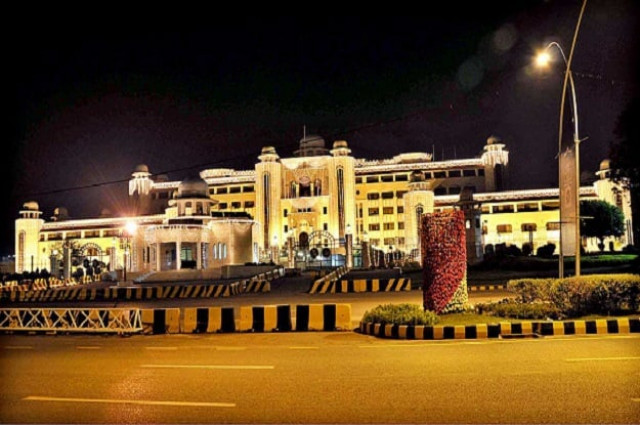Of buildings and universities
There is an urgent need for increased access and increased quality in our institutions

An illuminated view of PM Secretariat decorated with colourful lights in connection with the Independence day celebrations. PHOTO: APP
Education minister reiterates govt's plans to turn PM House into university
First, let us understand what a university or an institute of higher learning looks like. It is a place of scholars and students, who are able to come and go easily and as they please, to engage in discussion and debate. It is also more than a combination of buildings (an issue which we will come to later in this article). If a building or a set of buildings is inaccessible, due to its location, security concerns or lack of public transport, it defeats the core mission of access and engagement. While the current PM house may be a picturesque locale, it is an area of Islamabad that is in a high security zone, and not amenable to the movement of thousands (or perhaps tens of thousands) of students and scholars. Allowing tens of thousands of people to come in and out of the red zone may also be unacceptable to institutions in the vicinity of the PM house.
Second — while a university is more than a set of buildings, the infrastructure does play an important role in scholarly engagement. This is true both for research and for pedagogy. The PM house was purpose built for a different purpose, which did not include teaching, scholarly engagement and discussion. Does it have enough rooms for teaching? Conference rooms for small group meetings and enough open space for organic discussions?
Third — the nature of the infrastructure dictates the kind of research that can be carried out. It is clear that the PM House is certainly not suitable for any serious experimental science research. It is unclear whether it would even be ready for social science or humanities research given the lack of serious libraries on the premises.
Fourth — any institution of higher learning has an economic ecosystem around it. This includes shops for food, books, etc. An isolated place, with no real economic ecosystem will fail to survive and attract people to spend serious time there.
Fifth — the current PM has a private residence close by, and one he visits frequently. What if the next PM decides to live in the PM House, for which he/she is entitled to? What would then happen to the educational institution?
'Pay taxes, I will protect your money': PM Imran to nation
The argument by some in the government that institutions in the UK (and elsewhere) have also used churches, mansions and other buildings as educational institutions is also flawed. First, these churches, houses and mansions are not independent institutions but are mostly part of a university. Furthermore, these former structures are small units with a lecture hall and a few small offices. Before they became part of the university, most of these buildings were no longer in use, and are often easily accessible. If they are in fact in a remote location, they provide housing for the staff. Finally, none are in a high security zone.
There is no question that the need for quality higher education and research is acute — but it is best met by strengthening existing institutions, and creating new ones that are designed to meet the national goals. Higher education institutions created by a desire for austerity, and not for openness, engagement and scholarship, are unlikely to become the platforms of knowledge creation and dissemination.
Published in The Express Tribune, September 18th, 2018.
Like Opinion & Editorial on Facebook, follow @ETOpEd on Twitter to receive all updates on all our daily pieces.














COMMENTS
Comments are moderated and generally will be posted if they are on-topic and not abusive.
For more information, please see our Comments FAQ